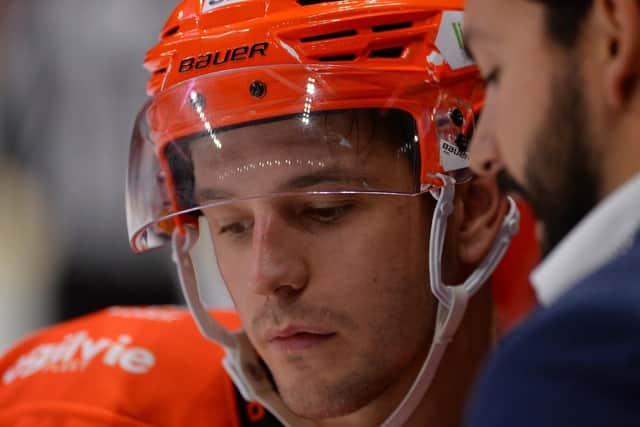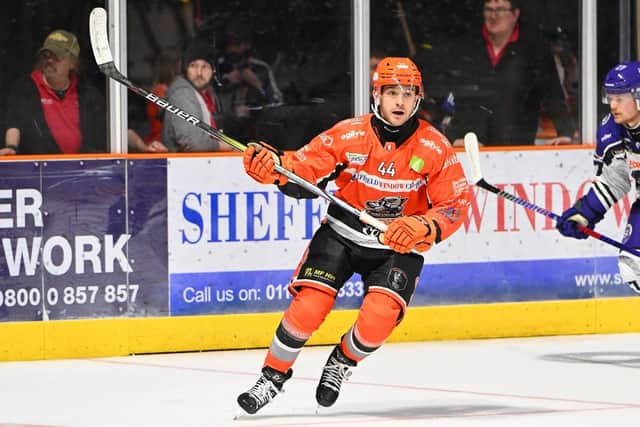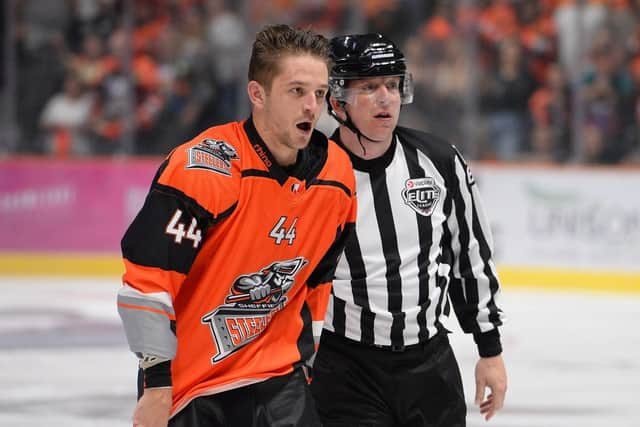Sheffield Steelers: Sam Jones an online hit as personal trainer showing others how to follow in his footsteps
That came in the form of defenceman Sam Jones only being a couple of weeks away from returning to contention for ice time.
The 26-year-old right-hander has been sidelined since the 4-0 road win over reigning EIHL champions Belfast Giants back on December 4.
Advertisement
Hide AdAdvertisement
Hide AdAs with any player experiencing time out through injury, it has been a frustrating time for Jones, born in Walsall but raised and trained in Canada before returning to the UK in 2016.


After a couple of seasons playing outside the Elite League, first with Milton Keynes and Lightning and Swindon Wildcats, Jones broke through into the UK top-tier in 2019.
Despite a first season with Fife Flyers that was hampered initially by injury and then cut short by the global Covid-19 pandemic, Jones clearly did enough to impress Steelers’ boss Fox.
That summer, he secured a move to South Yorkshire for a 2020-21 season that never got off the ground, save for the behind-closed-doors Elite Series in Nottingham which did at least see him debut for his new team.
Advertisement
Hide AdAdvertisement
Hide AdIt was during lockdown the previous year, though, that Jones discovered another outlet for his talents, one which has grown to see him become one of the most proactive UK-based online trainers for fellow hockey players.


Largely via his Sam Jones Sports Performance Instagram account, he specialises in handing out gym-based advice and programs as part of players’ off-ice training.
He also offers paid-for training programs for players aged 16 and over, something which has seen him work on a one-to-one basis with over 200 athletes in the past three-and-a-half years.
In contrast to Canada, where he was raised and trained to play hockey and where - as its country’s national sport - clear pathways and programs are set out for youngsters to become hockley players, Jones believed there was a crucial gap in the off-ice preparations of British players.
Advertisement
Hide AdAdvertisement
Hide Ad“I started this business right when Covid started,” said Jones. “When I went up to Fife, we had some extremely talented young British guys coming into the team.


“In Canada, there is more of a pathway on and off the ice where you get taught how to train to be a hockey player from a young age. In the UK, however, it’s not quite as prominent. A lot of people don’t even train, or even have that knowledge of how to train hockey players.
“So I wanted to be able to provide an affordable hockey-specific plan targetted at British hockey players that are having problems in learning how to train.
“It’s such a vital part of being a hockey player, yet you’ve got 18-year-olds who are more than talented enough to play in the Elite League, but they haven’t had that (off-ice) training knowledge passed down to them.
Advertisement
Hide AdAdvertisement
Hide Ad“The response has been great. I started it three-and-a-half years ago and I’ve been able to work with probably 200 athletes by now, from rec hockey players in the UK all the way up to guys that are playing on the national team.”
Once regular hockey returned for the Steelers and the rest of the EIHL in the autumn of 2021, GB international Jones realised he would have to battle for his ice time from the start, given he was now with a club where the levels of expectation were higher than in Fife.
He hopes that experience will help some of the players who have signed up for his training programs, giving them additional insight into what is also required mentally to make it as a pro.
As part of the one-to-one service that he offers, Jones finds himself talking to players who are keen to gain a mental edge as they try and make it to the top of their beloved sport.
Advertisement
Hide AdAdvertisement
Hide Ad“I’m on the phone with my clients once every two weeks,” added Jones. “And a lot of the time, we’re not only just speaking about their training, we’re also having lots of conversations about their career and how they can progress and how they can speak to coaches and get over those mental barriers.
“That’s another thing, too, going from never having to compete for a spot, putting up 100 points in Under-18s hockey in the UK, for example, and then transitioning from that to being a guy that’s fighting for a spot in the line-up.
“These are really difficult things that some players have a hard time navigating and just having somebody that’s not only experienced in the training side of things but has been there and done that in the hockey side of things, can only be helpful.
“When I got to the Steelers, I wasn’t playing that much, I was getting about five or six minutes a night. And I don’t blame anybody else but myself because I wasn’t playing well enough to get more ice time.
Advertisement
Hide AdAdvertisement
Hide Ad“And so I just want to be able to help guide these athletes because competing for these spots is not an easy thing to do - mentally more than physically.
“If I can help any athlete in any way that I can get over those barriers like I had to and get into the line-up and playing consistently and helping their confidence grow, then that is almost as important as the physical training side.”